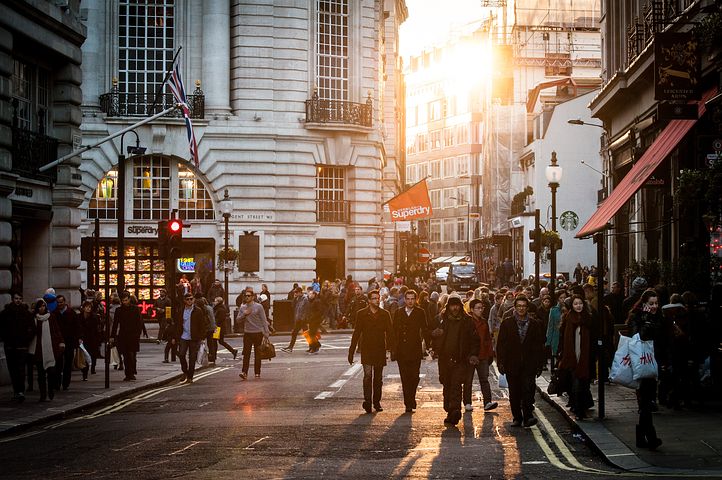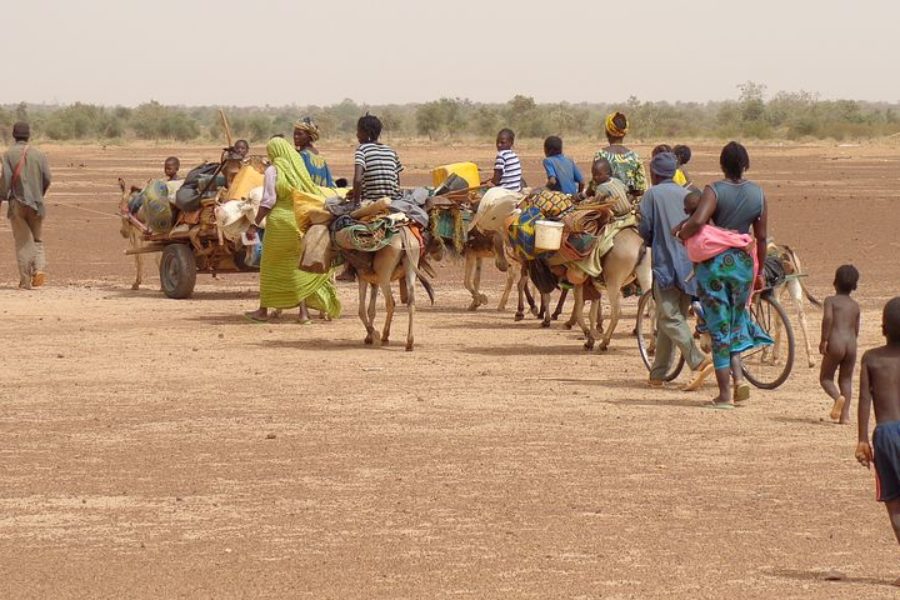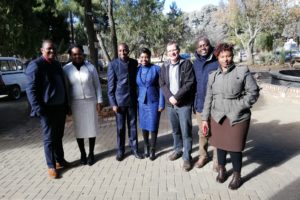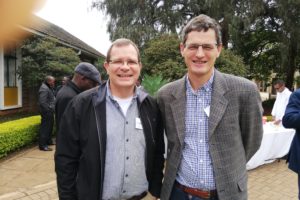I first came across the name of Dr. Asfa-Wossen Asserate watching an interview online with him on Deutsche Welle. Thomas Spahn talked to Asserate on the subject of his latest book African Exodus – Migration and the Future of Europe. In this book the Ethiopian-born German entrepreneur presents us with a compelling case why neglecting the issue of the African exodus will come to haunt not only Europe, but the entire world in the very near future. Let us take a closer look at his book under its own chapter-headings.
“On the run”
In his first chapter Asserate deals with current global crisis of mass migration. “The world is out of joint” he says, because “65.3 million people are on the run”. It effects one in 113 people on the globe. With every day that passes another 34 000 people, who fear for their lives, will leave their homes. The problem is escalating all the time. Over half of all refugees are under 18 years of age. There are currently 65 million refugees throughout the world. In the whole of Africa some 4.4 million people were on the run in 2015, 20 % more than the year before.
147 countries world-wide has joined the Genevan Refugee Convention of 1951. The intent was to protect anyone meeting the criteria of a refugee from discrimination and persecution, and to provide such a person with immunity from prosecution when illegally entering another country. It also seeks to protect a refugee from deportation and provide free access to courts. The sheer scale of the current refugee problem is simply gigantic. It poses a significant challenge to all the nations of the world.
The name of one of the world’s largest refugee camps, situated a 100 km’s inside Kenya’s border with Somalia, is called Dadaab. It has grown into a chaotic city covering 77 square kilometers. Translated into English its name means “hard, stony place”. That is exactly what it feels like to be a refugee. Or as one refugee who fled the Congo said: “In your whole life, pray to God never to be called a ‘refugee’ for a single day”. Asserate points out that the center of the problem lies in the “arc of instability stretching from Mali to Afghanistan”. The flow of refugees from Africa into Europe is however the author’s primary concern. Most of these migrants flee due to one single reason: bad governance. The problem with bad governance, as opposed to war, famine, poverty or pestilence is this: in all these other instances hope remains that the situation will improve. With systemic corruption it never will.
“The legacy of colonialism”
In his second chapter the author – himself an Ethiopian refugee now living in Germany – details the litany of colonialism’s failures and injustices. Europe was the colonizing continent. Africa was the colonized one. Colonization took off slowly in the 17th Century as European nations one after the other gained new confidence in navigating the seas, finally freed from the fear that their ships could perhaps sail off the edge of the world. It reached its peak in 1884 when German Chancellor Otto von Bismarck invited 13 European states and the Ottoman Empire to a conference in Berlin. Their conference room was dominated by a huge map of Africa. It was here that European powers divided up the continent and the final scramble for Africa began. Not a single African attended this conference. It was simply a case of “smash and grab”.
In some cases it led to war (the Boer War in South Africa). In others to brutal exploitation and inhumane suppression (the Belgian Congo). In German West Africa (today’s Namibia) it led to the first genocide of the 20th century, when a German commander issued a stern warning to an insubordinate tribe: “If the Herero refuse to comply, I will make them do so by force of arms”. At least some 70 000 Herero perished, along with 10 000 Namas. (The Belgians and the Germans have since confessed their atrocities to the people of the Congo and Namibia respectively. The British have not done so yet to the Boers – CFH).
And though the loss of life and limbs were by no means the norm throughout the continent, the loss of freedom, traditional customs, land and dignity certainly were. By the end of the Second World War two things were happening simultaneously. The colonized peoples of the world were awakening from their slumber, and the European powers likewise realized that they couldn’t hold on to their colonies forever. And yet in several instances, also in Africa, independence only came by way of drawn-out, bloody conflicts, partly due to the impatience of the subjects to throw off the yoke of colonialism.
Unfortunately independence did not usher in freedom. In most cases colonial governments were replaced by tin-pot dictators propped up by colonial powers and the CIA. These strong men exploited their own kinsmen for personal gain, or oppressed them mercilessly in their frantic bid to hold on to power. Much of the many gains of the colonial era (not the least a well-functioning infrastructure) were recklessly squandered. For example, in the year of its independence the GDP of Ghana was twice that of South Korea, while it’s per capita income equaled Spain’s. In Nigeria many workers could afford to buy a Volkswagen, while the country itself extended development aid to poorer neighbours when it reached independence. By the time of independence Kenya had dreams to produce its own automobile and Zaire its own missile technology! It did not however take long for all of that capital and hope to disappear like morning mist before the rising sun.
Africa’s new elites simply squandered its wealth. Asserate writes: “They regarded revenue from exports as their private income, and… ceased to give any thought to their populaces and their standard of living”. The primary aim of the ruling cliques was to retain power. The only problem was that their former masters in Europe were largely untroubled by all this, so long as their own national interests were not at stake. The Cold War also did its part in causing great powers to deal with African leaders behind the scenes in an all too shady fashion. Thus, when a US State Secretary complained to President Franklyn Roosevelt that the US was supporting dictatorships in South America and that they were all “bastards” the president responded: “Yes I know they are bastards, but at least they’re our bastards”.
For Africa’s leaders, and especially for the military strongmen seizing power through a coup, it became a matter of “once in power, always in power”. When possibly Africa’s worst post-colonial dictator – Jean-Bedel Bokassa – had himself crowned on December 4, 1977 as ruler of the Central African Republic, its former colonial master France sent him a two tonne gilded throne and a crown studded with 2000 diamonds as a coronation gift! Moral of the story is this: Though certainly no people on earth are immune from corruption, in Africa it became the national sport of the ruling class. And it’s that corruption that’s now driving its young people to vote with their feet, as they leave the continent in droves.
“Africa is always good for a surprise”
And yet it’s not all hopeless. Something is happening on the continent of Africa! Modern Africa consists of booming metropolises. Several economies have recorded double digit growth since the turn of the century. Africa currently has some 163 000 millionaires. There are also astonishing individual success stories, like that of the British-Nigerian female entrepreneur Ola Orekunrin. Trained as a medical doctor, she is inspiring a whole generation of new female entrepreneurs in Nigeria and beyond. There is also a boom in the energy sector and the world look in eager demand at the continent’s vast resources of mineral wealth. Oil has been discovered off shore in several countries that until recently had no oil. Interestingly enough though, the Arab Spring brought no growth to North African nations.
Whereas in 2000 The Economist could still talk of a “hopeless Africa”, by 2016 it reported that Africa’s youth are now better educated than ever before (with literacy rates exceeding 70%). In Sub Saharan Africa the proportion of people living on less than $1.90 per day fell from 56% to 35% during the past 25 years. Diseases ravaging Africa in the past – particularly malaria – have for all purposes been defeated. Some speak of Africa as the sleeping giant.
It’s for this very reason that a new scramble for Africa is well under way, with China taking the lead. China is involved in massive infra-structure and mining developments throughout the continent, by virtue of loans that these poor nations will unfortunately not be able to pay back. This is already leading to a new phase of servant-hood on the part of the African peoples, to a new master of course, from the East!
Meanwhile the internet has spread at breakneck speed, while the continent has also become the fastest growing market for mobile companies. There are already 67 million smartphone users in Africa. Companies like the Kenyan concern M-Pesa revolutionized safe money transfers by cellphone in East Africa and beyond. In Nigeria Jumia is engaged in setting up an alternative to Amazon, while South Africa already has its own counterpart to the American giant. Africa’s economic surge is also visible in the endless traffic jams caused by its rising new middle class, in the rising cost of land, and a host of new luxury hotels.
But, just when you want to get excited about the future, Asserate signals the concern. His own country Ethiopia, in spite of having so much going for it, is riddled with tribalism and corruption, sometimes causing severe hunger and deprivation. He also points out that 220 million Africans are starving at this moment. The vast majority of farmers in Africa still farm their fields as in Biblical times! Land-grabbing is another huge concern. Ownership of at least 5% of all farmland has changed hands over the last few years, while negotiations are under way regarding a further 20-30% of farmland.
Countries like China, India, Malaysia and Indonesia – who can barely provide enough land for their own people – buy or rent land in Africa for their own purposes. Though those in favour of land-grabbing maintain it is necessary to fight global hunger, Africa’s own indigenous people do not benefit from it in any way. They are often pushed off the land they used to farm. This is not to mention the environmental damage due to increased water usage, tree felling and the overuse of soil. “While their own populations go hungry, the ruling elites of Africa’s poorest states are busy selling off their land to foreign enterprises. It is not uncommon for local farmers… to be violently driven from their lands” says Asserate. According to him 23% of all farmland in Sudan is in foreign hands, 28% of Mozambique’s, 40% of Sierra Leone’s and 85% of Gabon’s!
Yet one of Africa’s greatest challenges without a doubt is posed by its massive population explosion. While most of the world is currently experiencing a drop in population growth, Africa and the Arab world are experiencing a surge. Africa currently has 1.25 billion people. It is likely to have as much as 2.57 billion by 2050, half of which will be under 25 years of age. The growth of its cities has been especially dramatic. In 1970 Addis Ababa had 600 000 inhabitants. Today it has 7 million. One hundred years ago Lagos, Africa’s largest city, had 37 000 inhabitants. Today it has over 15 million. By 2050 40% of Africa’s massive population will live in slums.
It’s is hard to see how cities will be able to keep up with providing even the most basic infrastructure needs of running water, electricity and a functioning sewage system. What is more, how will Africa be able to feed 2.5 billion people? What future can it offer to its youth? Will it be able to offer them education, not to speak of jobs?
But then, in the last third of this chapter the author turns again to by far Africa’s greatest burden: “corrupt regimes and elites”. Asserate provides an abundance of examples of which I name but a few: the curse accompanying Nigeria’s vast oil resources and Katanga’s mineral wealth (DRC); the systemic corruption that is crippling several states, from his own Ethiopia to post-apartheid South Africa; the abject misery of what is Eritrea and Zimbabwe, etc. On top of it all comes the massive failure of the Organization of African Unity, which simply refuses to discipline any of its member states for anything whatsoever. This is why millions of young Africans, from Senegal in the west to Somalia in the east, will simply vote with their feet, as they continue to dream of a better life in Europe across the Sahara and the Mediterranean. In Eritrea it is so bad, that literally every single citizen not in government wants to leave.

“Europe’s responsibility”
In his last chapter the German-Ethiopian entrepreneur and author deals with his own country and continent’s responsibility in successfully addressing the migrant crisis. What can they do? His book was unquestionably prompted by the 2015 crises when the German Chancellor let 1.2 million immigrants into her country. They walked all the way from the Middle East, through Turkey, Greece and the Balkan, as the Syrian War was raging on. But as Germany showed a welcoming face, Europe became more and more disunited about the issue.
By 2016 Germany’s welcoming culture had all but evaporated. “Frontiers were reasserted and a policy of deterrence was once more the order of the day”. Even Sweden radically tightened up its border. Central European nations such as Poland, the Czech Republic, Slovakia and Hungary came up in strong opposition to a plan to distribute refuges across member states of the EU. Others like Italy also seemed less supportive of the plan. In Germany a groundswell of opposition arose in the wake of disturbing events at New Year celebrations in Cologne and terror attacks in two other cities. Europe became an ever more divided continent. In June 2016 a majority of Britons voted to leave the EU.
At her own Christian Democratic Union‘s summit in Berlin Angela Merkel declared in June 2016: “We must deal with the question of Africa… The central problem is the migration of 1.2 billion people from Africa”. The so-called Dublin Regulation, according to which the European country where an asylum seeker first sets foot is responsible for processing his or her application for asylum, began to fall apart. It meant the main burden was borne by those countries on the periphery of the EU, and that’s not fair.
In the meanwhile border patrols were being upgraded, which included among other things rescuing shipwrecked migrants off the coast of Italy and other places. The Italians saved more than 150 000 migrants by the time this book was published in Operation Mare Nostrum. The EU also pumped 2 billion Euro’s into developing a ‘smart’ border with state of the art technology, keeping unwanted immigrants out. Not to be forgotten is also the fact that the EU had lost its most valuable ‘partners’ in helping them to control the African refugee problem. Tunisian dictator Ben Ali was swept from the throne by the Jasmine Revolution and Libyan dictator Muammar Gadhafi was overthrown and killed through another Western regime-change experiment in 2011.
In the midst of the refugee crisis a deal was struck with Turkey to contain the flow of refugees through that country, rewarding president Erdogan with 6 million Euro’s and a host of political concessions. Lots of money originally earmarked for development in Africa was now being poured into repatriating unwanted refuges and in helping African countries to keep such migrants home. The message was: “We’ll send you money as long as you don’t send us refugees”. Only problem was that some of these countries never kept their part of the deal.
All this means that freedom of movement has been greatly restrained for all Africans, even those wishing to visit Europe as honest tourists or students. Younger, poorer and less educated Africans have little chance of ever obtaining a visa for Europe.
Dr. Asserate also deals with the huge impact of unfair trade between Africa and the West. These “scandalous agricultural and trade policies” only function “to cement global inequality firmly in place”. He provides ample examples to prove his point. Europe dumps its unwanted poultry on Africa at such low prices that African farmers find it impossible to compete. In Ghana, importers of tomato puree from the EU have brought about a decline of indigenous tomato production in that country, putting thousands of Ghanaian farmers out of business. European food manufacturers ship their subsidized food products to Africa by tonne, squeezing home-grown products out of the market. Ghana now imports 50 000 tonnes of tomato puree annually from Italy. And yet, a large number of tomato pickers employed in southern Italy come from Africa! Having no papers, they have become Europe’s “new slaves”.
He also explains how EU fisheries policies are proving increasingly ruinous to Africa. Huge trawlers from Europe, Russia, and especially the Far East, have a feast off the African coast, threatening the livelihood of thousands of fishermen. A big ship from any of these countries catch as much in a single night as a Mozambican or Somali fisherman can catch in a year!
What about development aid? Conservative estimates suggest that over the past 60 years around two trillion US Dollar of aid has made its way to Africa. But everywhere the question is being asked: How is it that Africa is hardly any better for it? What has happened to all this money? Has all this “development aid” not robbed Africans of their dignity and initiative (just like hand-outs do in socialist countries in the West – CFH)? So often development aid never reached those for whom it was intended, ending up in the hands of ruling kleptocrats. What is sure is that no-one can retain his dignity who is forever regarded as an aid recipient. According to Axelle Kabou of the Cameroon, who worked for many years in the development sector, the heart of the problem lies in the fact “that ‘black elites’ were incapable of changing and many Africans were unwilling to develop their continent through their own efforts”. Some, like Kenyan economist James Shikwati, even go so far as to advocate for the cessation of all development aid.
In light of it all, some are now calling for a “Marshall Plan” for Africa. Our author himself has been advocating for it for years. In January 2017 the German government published a policy document titled “Cornerstones for a Marshall Plan for Africa”. Everyone knows that enormous efforts will be required to advance the vast continent of Africa economically. Key question is (again): “With whom will such a plan be agreed? What will prevent the funds to end up in the pockets of autocrats again?” After all, there has been no lack of grandiose projects in the past.
One has to remember that countries cannot be developed “from the outside” so to speak. Countries develop internally, and to do so they need a government and a people who are working together towards the same goals. That’s the reality facing Europe. It needs to understand that no economic development will happen without political development. That leads to Asserate’s key point on page 163 of his book: “Europe finally has to put an end to the disastrous policy of appeasement towards African dictators”.
This is not about making demands, or about foisting Western concepts on Africa. European leaders must see to it that African states begin to observe the principles they have adhered to themselves. They are for instance all signatories of the UN Charter of Human Rights. “Anyone in Africa who is not prepared to abide by these principles should have their support rescinded. The sovereign states of Africa have now been independent for more than 50 years. They quite rightly expect the West to treat them as equal partners…” Intrinsic to such equal treatment is however being open to criticism as well. “Governments that flout the principle of the rule of law and that ride roughshod over human rights do not deserve any assistance”.
But, someone could ask, would Europe not risk losing its influence and driving Africa into the arms of China through such a policy? The Chinese is known for their policy of non-interference, as much as it detests interference in its own affairs.
It is crucial that the West stop paying lip service to ideals such as democracy, human rights and combating corruption. Africa’s dictators will understand plain speaking. “I am convinced that a credible threat to choke off the supply of money to them would achieve the desired result”. But that will require European states to speak with a single voice, and this is exactly where the problem comes in. “As long as each country in the EU pursues its individual interests in Africa, Africa’s leaders will continue to be able to play one off against the other. But if the EU were finally to bring itself to adopt a common policy, its word would carry far more weight”.
Furthermore, Europe must abandon its catastrophic economic and trade policies. “It must finally put an end to subsidizing its farming industry at the cost of developing nations”. It must effectively lobby against land grabbing. Farming remains key to Africa’s renaissance. Africa needs broad based support for farming on all scales as well as affordable infra-structure development, so as to bring produce to the markets. But most importantly, Europe must do all it can to ensure that Africa is properly governed.
As an example of such governance, our author points to the new Tanzanian leader John Magufuli, elected in 2015. Upon election he cancelled celebrations of independence, as well as a lavish state banquet for the opening of parliament. The money saved would go for hospital beds and fighting cholera. Shortly after he started an ambitious campaign against corruption in several departments, and slashed the bloated cabinet of his predecessor by half, capping all ministers’ salaries. He also stopped business class flying for cabinet ministers. The money thus saved would be spent on improvement of education. The result of it all: An exciting new English verb began to appear everywhere in East Africa: to “magufulify”… which means to sweep away corruption!
In his epilogue Asserate states that Europe would not be able to isolate itself from the problem without losing face. Europe must realize that that a common future, underpinned by democratic principles and a fair system of global trade, is the only way forward. In the process Europe must be prepared to give up a little of its prosperity. European leaders therefore now need the courage to make good governance the sine qua non of future Afro-European development cooperation.
Some closing comments
I found Asserate’s arguments coherent, honest and convincing. This is a timely and very important book for whoever may be concerned about the future of Europe, Africa and the world. The author succeeds in destroying the one-sided perception most of us here in North America would have of Africa: that their problems were all of their own making. Secondly he also avoids – as an African – the other extreme (so popular on the Left) that all blame should be placed on colonialism and the West. Lastly, he puts his finger on the most crucial issue threatening not only the future of Africa, but that of the entire West as a civilization: our pitiful culture of appeasement.
A few additional observations can also be made…
1. Our author omits mentioning that a key reason for the migration crisis is simply this: the world is full! Never before has humanity faced such a reality.
2. He also failed to see how the intervention of Russia in the Syrian War in August 2015, was key in ending that war and slowing the flow of refugees to Europe.
3. It should strike any observant reader – reading the endless tale of African misery, stretching from Algeria to Zimbabwe for a whole century and more – that one country is strangely absent in the author’s sorry tale: the country so long viewed as the pariah of the entire world: the old South Africa!
4. It is of great importance to realize that if South Africa falls (and many say she is on the brink) that the migration threat to Europe will seriously increase overnight.
5. It is rather strange that the author omits the massive threat of Islamic Dawa and Jihadist terror as a major factor threatening Africa’s future.
6. It’s is also remarkable that the author spends no time in exploring the severely crippling aspects of Africa’s traditionalist animist worldview for is struggling politics and economy.
7. Finally, one cannot get away from the idea that what Africa needs above all is the liberating Gospel of Christ and its all-inclusive awesome Kingdom perspective. A London-based columnist wrote back in 2008 in the London Times (after having traveled through the continent in a Land Rover with his friends) that what Africa needs above anything else is the God of the Gospel. Mathew Parris wrote that reluctantly as an atheist (!) having seen the huge difference the Gospel made all through Africa, whenever they came across true Christians.
Resource: Asfa-Wossen Asserate: African Exodus – Migration and the Future of Europe (Translated by Peter Lewis), Haus Publishing Limited: London, 2018, 199 pages.








